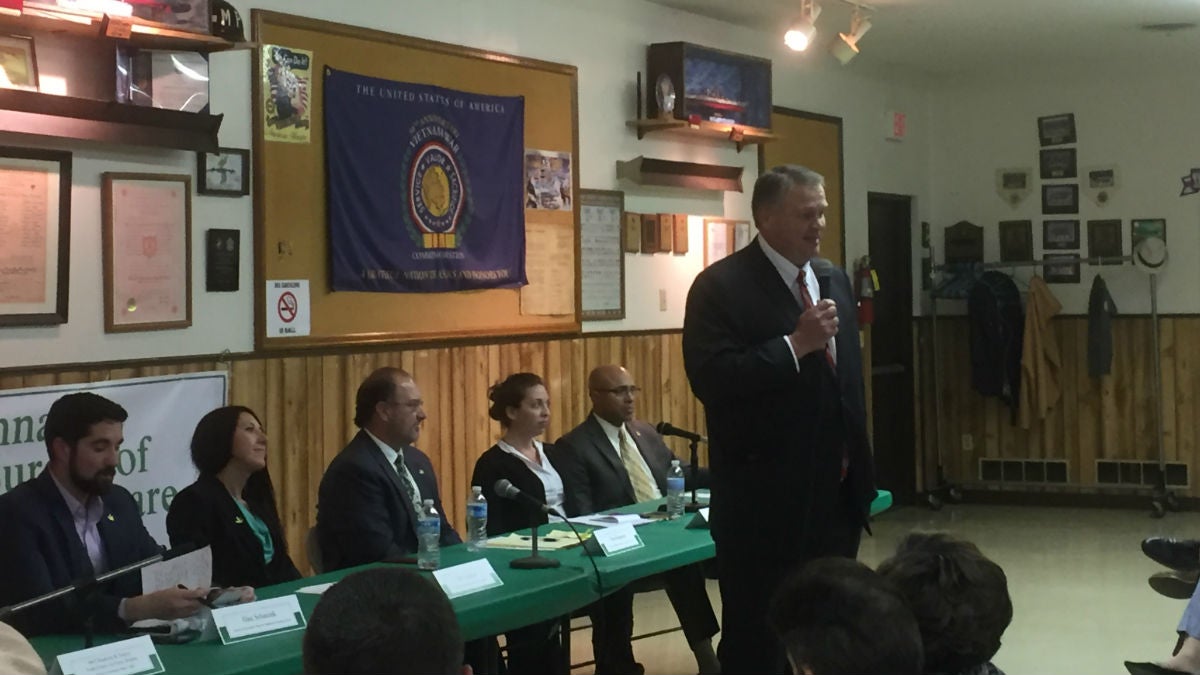Advocates, politicians, discuss marijuana legalization at town hall

Republican candidate for governor Colin Bonini talks at a Cannabis Bureau of Delaware forum on legalizing marijuana. (Zoe Read/WHYY)
Are attitudes about marijuana changing to the point where the drug could become legal like it is now in some western states? The Cannabis Bureau of Delaware hosted a town hall to test that idea Tuesday night.
Sarah Bargas considers the drug a life saver. Three years ago she was diagnosed with stage four cancer.
She had faced cancer before, and used conventional treatment to cure it. This time around, Bargas, a registered nurse, was given three to six months to live.
She decided to ditch conventional treatments for marijuana extract oil treatments. Bargas was able to wean herself off prescription opioids—and she’s still alive to tell her story.
On Tuesday night, she told her story to about 100 Delaware supporters of marijuana legalization at a town hall in Camden.
“It’s something everyone should have safe access to,” Bargas said. “If they’re using cannabis to get a laugh, that’s still therapy. Everyone has a right to have that cannabis available to them.”
The event, hosted by the Cannabis Bureau of Delaware, is part of a series to educate the public and law makers in an effort to pass legalization legislation.
A panel of advocates, and experts in the law enforcement, criminal justice and health fields discussed the problems of prohibition and how legalization for those 21 and older could benefit the state.
“We’re trying to create an open and honest dialogue within our community, because this is a community issue, it is affecting the community and the community needs to be present for these conversations,” said Zoë Patchell, co-chair of the Cannabis Bureau of Delaware.
Medical marijuana already is legal for adults and children with certain qualifying medical conditions.
Attitudes about marijuana use have been changing in Delaware. Delawareans over 18 have been able to receive doctor-recommended medicinal marijuana with a state-issued ID approved by their physician since July 2012. Patients can take the ID to the state-run dispensary in Wilmington to receive the medication.
Last year, the use of medical marijuana oil was expanded to those under 18, if they have intractable epilepsy and certain muscle disorders.
A law signed by Gov. Jack Markell, D-Delaware, eliminating criminal penalties for adults charged with possessing small amounts of marijuana for personal use in their home went into effect in December 2015.
However, advocates and some legislators want to take it a step further and legalize marijuana entirely. State Sen. Margaret Rose Henry, D-Wilmington, wants to introduce legislation to make marijuana use legal for those 21 and over. She has said the legislation would curb racial disparities in the justice system and improve the economy.
Patchell and Tuesday’s guest speakers said prohibition diverts law enforcement from more serious crimes, creates more crime and violence through the illicit market and wastes millions of taxpayers’ dollars. In addition, advocates of legalization are concerned that African Americans are more than three times more likely than whites to be arrested for marijuana possession, according to the American Civil Liberties Union.
They say legalization can generate significant tax revenue, create jobs and help law enforcement focus on violent crime.
Advocates also believe tobacco and alcohol have more adverse health effects than marijuana, and say cannabis is not the gateway drug others allege.
Mark Thompson, a spokesman for the Medical Society of Delaware, said there’s still not much evidence-based research or sound clinical studies involving marijuana and the Society would advocate for more research involving the effects of cannabis.
During the town hall meeting, Neal Franklin, the executive director of Law Enforcement Against Prohibition, said marijuana prohibition has done more harm than good.
He said youth are selling drugs on the streets under the watchful eye of gang leaders, because it is not regulated and controlled. Franklin also said the thousands of marijuana possession arrests per year are counterproductive to public safety.
“Do you think these guys are going to return to your community safer? For the most part…they come back to us in worse shape. Many can’t get jobs (after being arrested) or it’s so difficult they go back (to drug dealing),” he said.
Kimberly Petters, who retired from the U.S. Air Force after suffering PTSD, told her story about how medical marijuana has improved her quality of life. She said doctors prescribed her numerous drugs for her depression and anxiety, but nothing was as successful as medical marijuana.
“It’s what’s keeping me not wanting to die,” Petters said.
However, it took eight months to find a doctor to sign off on the medical marijuana card. It’s also not covered by Tricare, the health insurance for military, their family and veterans. She currently pays more than $1,000 a year for her medication.
She said current treatments are causing homelessness, addiction and suicide among veterans.
“Current treatments are harmful, ineffective and dangerous,” she said.
Advocates hope legalization would make marijuana more readily available to those who need it, and believe competition would lower the current prices.
The hearing caught the attention of some state legislators and those running for governor. Gubernatorial candidate State Sen. Colin Bonini, R-Dover, was there. He says current decriminalization is ineffective.
Bonini told voters he’s open to suggestions, as he’s never tried marijuana before—causing someone in the crowd to shout out, “Try it man!”
Bonini’s opponent, U.S. Congressman John Carney, D-Delaware, did not attend, but has said he would prefer to examine decriminalization and medical marijuana laws before supporting complete legalization.
“I think we have the worst of both worlds. We decriminalize it to the point it’s de facto legal, but you can still get in trouble for it. That’s crazy. If we’re going to do it lets do it,” Bonini said. “I think we should legalize it for people over 21 years of age for their own private use, and if we do that we’ll keep it out of hands of kids and put a big dent in the illegal drug trade.”
State Rep. Sean Lynn, D-Dover, said he was initially opposed to decriminalization because he felt it was an economic development bill for drug dealers.
“You could possess an ounce or less of marijuana, but there was no legal mechanism by which you could acquire it and you couldn’t ensure what you were receiving could be safe,” he said.
However, his thoughts changed when he considered the racial disparities in the criminal justice system. Lynn said he will vote in favor of Henry’s bill next year.
“Number one, we need the money. Revenue projects have us $150 million in the hole next year. We’re $50 million in the hole for the existing year,” he said.
“We’re going to have two years, I think two years is sufficient time to get it right, especially when we have other states to find a model that works. We can look at some of the problems they’ve encountered and draft and tailor legislation to avoid those problems.”
Town hall attendant Jude McDonald, a lobbyist for Delaware NORML, an organization advocating for marijuana legalization, said her group is educating lawmakers.
“We have to work with the politicians, because they really do not know and they don’t understand this opioid addiction is a piece of the puzzle that can be solved,” she said.
McDonald said she’s positive legislation will eventually pass and benefit the whole state.
“I believe years from now we’re going to be teaching how to grow cannabis in community colleges. If Delaware was to have business model that we could sustain, absolutely,” she said.
“The whole east side of Wilmington, we can redevelop all that, downstate hemp farmers growing hemp again, I think the soy business is over in Delaware and the farmers are looking for something.”
Regina Stachnick of Harrington, a medical patient who said she was able to wean off prescription OxyContin because of the benefits of medical marijuana, said she also supports the legalization of recreational use. However, she said she attended the meeting to make sure medical marijuana wouldn’t be affected.
“Most places when they legalize it they’re limited to how much you can buy in a day. If they do that to people on medical it isn’t going to work for us. If they don’t put it in there we’re going to have a problem,” she said. “Without the medical marijuana it means I have to go on pills, and I really don’t want to.”
Town hall attendant Gary Kalmus of Fredrica, a member of Veterans United Outreach of Delaware, said he’s in favor of legalization and believes it could benefit veterans facing various challenges, such as depression or other illnesses.
“It’s safer than alcohol, for medicinal purposes it should be readily available for anyone who needs it,” he said.
Kalmus said the meeting may have helped him decide who he’s voting for on Nov. 8.
“It may have extremely influenced my choice of governor,” he said.
The Bureau will host a similar town hall at the Athletic League in Wilmington on November 17th at 7 p.m.
WHYY is your source for fact-based, in-depth journalism and information. As a nonprofit organization, we rely on financial support from readers like you. Please give today.





